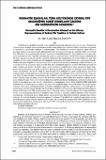Please use this identifier to cite or link to this item:
http://hdl.handle.net/11547/11188| Title: | Romantic Bandits: A Devaluative Attempt on the Literary Representations of Zeibek/Efe Tradition in Turkish Culture |
| Authors: | Luleci, Murat |
| Issue Date: | 2022 |
| Series/Report no.: | 136; |
| Abstract: | Banditry has an important place in Anatolia, which has been the cradle of many cultures. Zeibeks, considered as one of the last rings of the medieval Alperen type in Anatolia, have existed for centuries with their own traditions and rituals. Zeibeks, which are also accepted as the symbol of Turkish peasantry and which can years. However, elements such as freedom, heroism, justice and benevolence in Hobsbawm's definition of social banditry correspond to a value area rather than a class category. Zeibeks fulfilled a function in Turkish history, which is one of the examples of non-Western modernization, to fill the gap arising from the depreciation caused by modernity. The modern world has given traditional societies a kind of cultural schizophrenia. This emerged as a traumatic experience arising from the fact that society, which is between the East and the West, experienced modernization on the one hand and wanted to continue the tradition on the other. Being stuck between East and West and experiencing a kind of cultural schizophrenia, the individual has developed the perception that the world of values is interrupted. Modernity has led not only to an economic development, but also to a traumatic loss of value in the collective consciousness of society, especially in non-Western societies. This loss of value has led to the emergence of a value gap between the state authority and peasantry, and zeibek tradition has turned into a structure that fills this gap. Zeibeks filled this void created by this trauma through values. When we look at the literary representations of cultural values, zeibeks primarily assumed a function of establishing justice. Secondly, zeibeks kept their belief by maintaining the traditional culture in the field of belief, thus resting on a ground that coincides with symbolic value areas of people. Finally, zeibeks represented values such as custom, heroism and generosity peculiar to traditional societies. In order to reveal which value areas zeibeks filled, Turkish modernization process is considered a breaking point; following, valid cultural metaphors before and after this breaking point were determined and then literary representations of cultural values were examined. The positive image of Zeibeks is closely related to the representation of traditional val-ues. For this reason, a reading on values will reveal more consistent and meaningful results in the interpretation of the zeibek tradition in Turkish culture. This study will perform a close reading of the values (devaluation) on Kantaragasizade Omer Selahaddin's novel Adil Mevla (1927), Sabahattin Ali's Kuyucakli Yusuf (1937) and Yasar Kemal's Cakircali Efe (1972). |
| URI: | http://hdl.handle.net/11547/11188 |
| ISSN: | 1300-3984 2146-8087 |
| Appears in Collections: | Web Of Science |
Files in This Item:
| File | Description | Size | Format | |
|---|---|---|---|---|
| 7.Effect-of-Psychodrama-on-Fibromyalgia-Patients’-Pain-Levels-Quality-of-Life-and-Skills-of-Expressing-Emotions.pdf | 359.88 kB | Adobe PDF |  View/Open |
Items in DSpace are protected by copyright, with all rights reserved, unless otherwise indicated.
